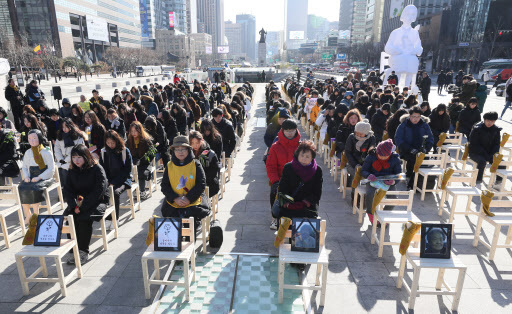South Korean civic groups demanded Wednesday the government nullify the Korea-Japan deal over Japan’s wartime sexual enslavement of Korean women, after a task force revealed that the government led by ousted President Park Geun-hye had made secret agreements with Japan in connection with it.

They also urged the Moon Jae-in administration to dissolve the state-run Reconciliation and Healing Foundation, which was established to support the victims as a result of the deal, and return the funds totaling 1 billion yen offered by Japanese government.
“In any of the process and the result of the 2015 deal, there were no concerns for the victims and there were no efforts made by the Korean government to reflect victims’ positions,” the groups said at a press briefing in front of the Foreign Ministry building in Seoul.
“The Moon Jae-in government must immediately accept the result of the task force’s probe and victims’ demands and must not delay the nullification of the 2015 agreement,” they said, criticizing the Moon administration for “remaining silent” on the issue.
Announcing the result of its five-month investigation into the much-disputed deal earlier in the day, the Foreign Ministry task force said that the Park administration hid some of the details of the deal from the public to avoid a backlash over concessions it made to Tokyo.
Among the secret agreements were the Korean government’s promise to “persuade” a civic group supporting the victims -- the Korean Council for the Women Drafted for Military Sexual Slavery by Japan -- to accept the deal, as well as its promise not to support the erection of statues symbolizing sex slavery victims.
The rights groups for the victims have called for abolishment of the deal made on Dec. 28, 2015 between Seoul and Tokyo, saying that the deal failed to reflect the victims’ demands -- a sincere apology and legal compensation from the Japanese government.
In the deal -- described by the two countries as “final and irreversible” -- Japan offered the funds to the foundation and an apology to the surviving victims in return for Seoul’s promise not to raise the issue again in international forums.
At the time of the agreement, only 47 victims of the 238 registered with the government were still alive, with their average age at 90.4. Now, only 32 victims remain.
“The government is said to maintain a reserved stance on the issue for a while, separating the investigation result from its official position, due to the possible impact it could have on the PyeongChang Olympics next year,” said Yoon Mi-hyang, president of the Korean Council for the Women Drafted for Military Sexual Slavery by Japan. “The Moon government should take responsibility for the victims.”
The civic group held this year’s last weekly rally, the 1,315th, in downtown Seoul earlier in the day, with some 500 people in attendance. They paid tribute to victims and demanded the Korea-Japan deal be annulled.
“The presidential office and then-ruling Saenuri Party touted the deal as a diplomatic achievement that none of the previous government had made when the deal was struck. All of them should be held accountable,” said Park Jung-eun, secretary-general of the People‘s Solidarity for Participatory Democracy.
A separate task force under the Gender Equality Ministry also unveiled a result of its probe into the Reconciliation and Healing Foundation. The foundation was established hastily following the bilateral deal and the ministry made aggressive efforts to persuade many of the reluctant victims to receive cash payments from the foundation, according to the internal probe.
The ministry, however, said that it still has no immediate plan to disband the foundation.
Japan’s sexual enslavement of Korean women remains one of the key points of diplomatic dispute between South Korea and Japan.
According to historians, up to 200,000 women, mostly from Korea, are estimated to have worked as comfort women at Japan’s front-line brothels during World War II. Japan colonized Korea from 1910-45.
(laeticia.ock@heraldcorp.com)
-
Articles by Ock Hyun-ju








![[KH Explains] Hyundai's full hybrid edge to pay off amid slow transition to pure EVs](http://res.heraldm.com/phpwas/restmb_idxmake.php?idx=644&simg=/content/image/2024/04/18/20240418050645_0.jpg&u=20240419100350)







![[From the Scene] Monks, Buddhists hail return of remains of Buddhas](http://res.heraldm.com/phpwas/restmb_idxmake.php?idx=652&simg=/content/image/2024/04/19/20240419050617_0.jpg&u=20240419175937)

![[KH Explains] Hyundai's full hybrid edge to pay off amid slow transition to pure EVs](http://res.heraldm.com/phpwas/restmb_idxmake.php?idx=652&simg=/content/image/2024/04/18/20240418050645_0.jpg&u=20240419100350)

![[Today’s K-pop] Illit drops debut single remix](http://res.heraldm.com/phpwas/restmb_idxmake.php?idx=642&simg=/content/image/2024/04/19/20240419050612_0.jpg&u=)